Mahalia Jackson |
|
MAHALIA JACKSON: THE WORLD'S GREATEST GOSPEL SINGER |
|
Mahalia Jackson's influence on African American music, primarily Gospel, soul, rock, and rhythm and blues, is extraordinary. Hailed "The World's Greatest Gospel Singer", "The Queen of Gospel Song", Mahalia Jackson pushed the boundaries in her time, becoming a Gospel superstar across racial, gender, and ethnic divides both at home and the world. Her boldness and dazzling fervor would leave its trailblazing mark for years to come, reminding everyone of music's impact and power and the strength of African Americans and women.
Born in New Orleans, Louisiana on October 29, 1911, Mahalia Jackson's music career began as a choir member in her Baptist church at a young age. Drawing inspiration from her church's unique style of Gospel, the popularity of ragtime and jazz music as well the blues of Ma Rainey, Ida Cox, Mamie Smith, and Bessie Smith, Mahalia began to incorporate these styles into her performances. In 1927 at the age of sixteen, she moved to Chicago, became a choir member of the Greater Salem Baptist Church choir, and eventually got her breakthrough recording with the popular Gospel group The Johnson Brothers who were the sons of the Greater Salem Baptist Church's pastor. Once the group dissolved in the mid 1930s however, Mahalia ventured into a solo career and by 1937 recorded songs such as "My Lord" and "God's Gonna Separate the Wheat from the Tares" under Decca Records in Chicago, becoming the first Gospel singer signed to the label as well as one of the pioneering performers to infuse blues into a Gospel work.
Despite the beautiful and uniquely done recordings, sales of her album 'God's Gonna Separate the Wheat from the Tares' did not fare well and led her to a new home in 1946, Apollo Records in New York City. Although sales of "I'm Going to Wait Until My Change Comes", "I'm Going to Tell God," "He Knows My Heart", and "I Want to Rest" for the label proved unsuccessful, she finally was able to break ground with her 1948 single "Move on Up a Little Higher" (although the song had been finished being recorded in the fall of 1947). The record became immensely popular and influential that stores could not meet the demands. All this played into "Move On Up a Little Higher" becoming the biggest Gospel recording of all time, selling over a glowing one million copies.
Famed for her rich, bluesy contralto voice, her wide range and spiritual performance that pushed the envelope, Mahalia Jackson became a superstar and appeared throughout various revered television programs, often compared to blues legend Bessie Smith by fans, jazz critics, and the media. The year 1952 brought more sweet rewards as she won the French Academy award for "I Can Put My Trust in Jesus" and reaped the benefits of a successful European tour. Two years later, Mahalia Jackson fronted her own weekly radio series on Chicago's CBS and further pushed divides as her multi-racial band infused Gospel music with barbershop singing, thus becoming more popular with both white and black audiences. Blessed with a record deal at Columbia Records, a Top 40 hit "A Rusty Old Halo" (where its choirs, overdubbed voices, and strings would later mark her signature sound), a cameo in the film Imitation of Life, and an invitation to sing at the 1958 Newport Jazz Festival and at John F. Kennedy's Presidential Inauguration, Mahalia Jackson also became an important and influential figure during the Civil Rights Movement, befriending the Great Martin Luther King Jr. Her influence cannot be measured to the profound impact she had during this time, reminding her brethren that the black church was the root of the African American community of expression and voice and that God was the one who knew what was right and what was wrong even during such unjust times as is evident through her music and expression. Supporting the Alabama Bus Boycott, singing "I Been 'Buked and I Been Scorned" before a crowd of over 200,000 in the spring of 1963 on the steps of Lincoln Memorial in Washington, DC before Martin Luther King's phenomenal "I Have a Dream" speech, Mahalia Jackson became a symbol of influential and empowering strength.
During Martin Luther King's funeral service, Mahalia Jackson sang his favorite Gospel song "Precious Lord, Take My Hand (Take My Hand Precious Lord)" as Coretta Scott King described Mahalia as "black...proud...(and) beautiful". Martin Luther King Jr. was also quoted saying a positive message about the Gospel Queen before his death: "A voice like this comes, not once in a century, but once in a millennium." Despite the later public divorce scene and health problems as a result, Mahalia Jackson still held ground as a figure not to be reckoned with during her last years, ending her career in 1971 with a farewell concert in Germany and a last television appearance on The Flip Wilson Show. She died January 13, 1972 in Evergreen, Park Illinois and was later inducted into the Gospel Music Association's Gospel Music Hall of Fame in 1978.
Recording with Duke Ellington and Thomas "The Father of Gospel Music" Dorsey, singing for four presidents, befriending Martin Luther King Jr., appearing on various popular television programs, and influencing giants such as Aretha Franklin who listened to Mahalia Jackson sing at Reverend C.L. Franklin's New Bethel Baptist Church in Detroit, Mahalia Jackson will forever remain an important and influential music legend of the 20th century.
|
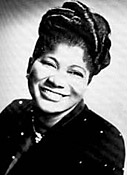
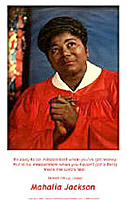
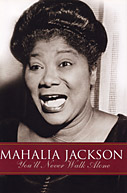
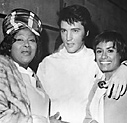
Mahalia Jackson with Elvis Presley and
Barbara McNair on the set of "Change of Habit"
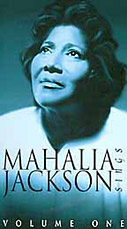
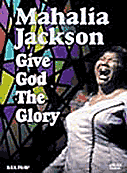
|
Mahalia Jackson knew African American music and its roots:
|
|
African American, in expression, is a "rebellious" culture with the Black Church playing a fundamental role in its history. From slave songs, Gospel, ragtime, jazz, to rock, soul, hip hop, and blues, African American music pushed boundaries from the norm, at first shunned but later embraced and also to a certain extent masked. This "rebelliousness" owes its roots to Africa and the slavery decades as well as the continuing racism and mistreatment of African Americans even after emancipation.
In Africa, "a nation of expression", music, dance, and poetry were an integral part of society, creating distinctive performance practices and musical instruments as a result. Almost every daily activity was surrounded by appropriate music, such as hunting songs, fishermen/boating songs, warrior songs, recreational songs, works songs, ceremonial songs, etc. Dance was an important feature to the accompaniment of music, and every village had its professional musicians who were expected to be virtuosic in performance and know the history and literature of their ancestors. Europeans and other peoples of the world were fascinated by the Africans' "extempore" singing, and four kinds of expression were heard--speech, chant, recitative, and song. Thus, four universal elements are found in African American music:
1) "blue notes"
2) call and response
3) syncopation
4) improvisation
From Africa came slave songs, from slave songs came blues, country, jazz, rock, soul, funk, hip hop, dance/electronica, etc, all progressions. So what does Mahalia Jackson mean that "rock and roll was stolen out of the sanctified church!" Well, one must note that the first true music genre from African Americans after slave songs was spirituals/Gospel music rooted in the centrality of the Black Church. Although other cultures/races etc. contributed their share to each music genre in the African American world, music is for everyone to enjoy and should know no color boundaries.
|
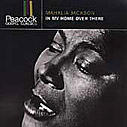 |
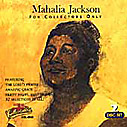 |
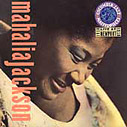 |
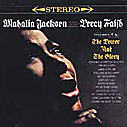 |
In My Home Over There |
Apollo Years |
Live At Newport '58 |
The Power And The Glory |
|
SOME IMPORTANT/INFLUENTIAL RECORDINGS: |
|
God's Gonna Separate the Wheat from the Tares
Keep Me Everyday
God Shall Wipe All Tears Away
Oh My Lord
Move On Up a Little Higher
I Can Put My Trust in Jesus
Silent Night
A Rusty Old Halo
There's Not a Friend Like Jesus
Amazing Grace
Just Over the Hill
The Old Rugged Cross
Go Tell It on the Mountain
You'll Never Walk Alone
Joshua Fit the Battle of Jericho
|
Walkin' to Jerusalem
Nobody Knows
Deep River
His Eye is On the Sparrow
The Treasure of Love
Just As I Am
Something Bigger Than You and I
When the Saints Go Marching In
I'm Grateful
Take My Hand Precious Lord
He's Right on Time
Trouble of the World
He's Got the Whole World in His Hands
My God is Real
There is a Balm in Gilead
|
|
|
QUOTES:
|
|
"It is easy to be independent when you've got money. But to be independent when you haven't got a thing that's the Lord's test."
"God can make you anything you want to be, but you have to put everything in his hands."
"Rock and Roll was stolen out of the sanctified church!"
|
|
